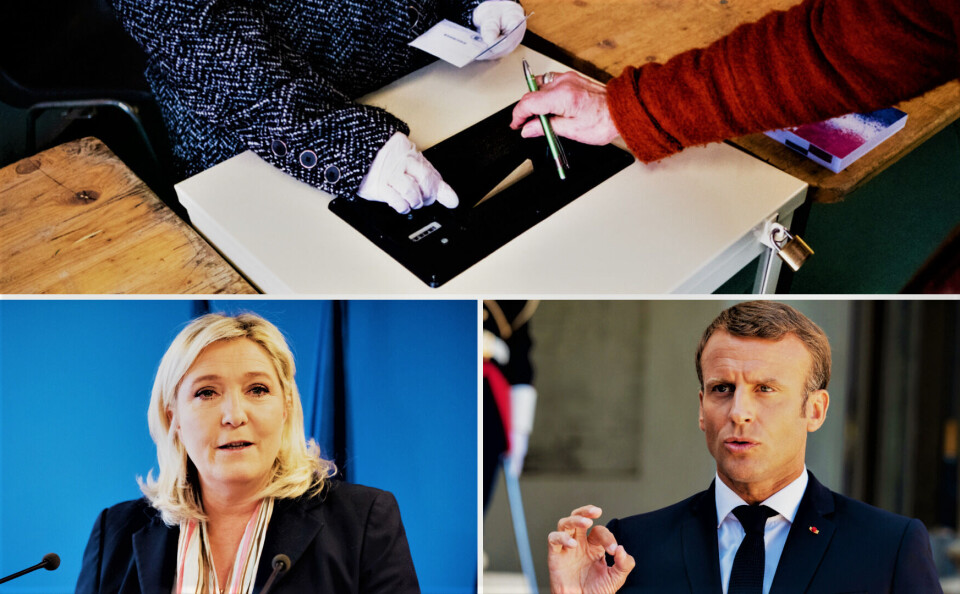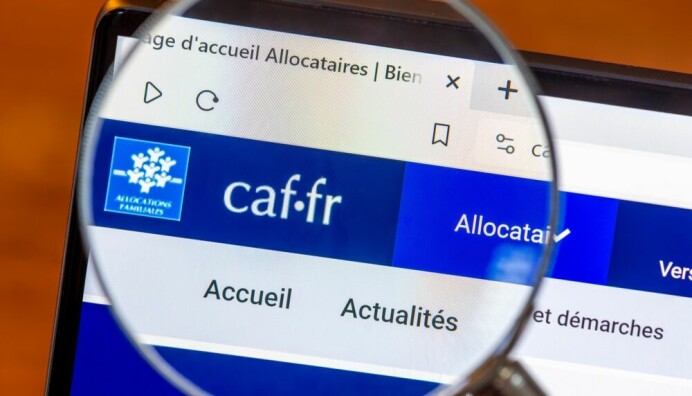-
Photos: Northern Lights dazzle Normandy skies
Coloured hues were also snapped in some areas of Brittany, with activity peaking before midnight
-
Easter traditions across France: From rattles and hooded processions to giant omelettes
Regional Pâques celebrations highlight France’s cultural diversity
-
French Google website google.fr will soon be replaced
Technology advancements have made local searches obsolete
Le Pen polling is closer than previous far-right matches in France
The gap between candidates is similar to second rounds between two traditionally accepted politicians

Marine Le Pen’s high polling score ahead of the French presidential election on Sunday (April 24) is unusual for a far-right candidate, the head of a polling institute has said.
She has 47% of the public intention to vote in an Odoxa-Mascaret poll carried out yesterday (April 21) on behalf of the magazine L'Obs.
“This score does not at all correspond to the usual score of a social-democratic president facing a 'far-right' opponent,” Gaël Sliman, head of Odoxa, told l’Obs.
He said it more resembled a classic score between two “usual” rivals, such as Hollande-Sarkozy, Sarkozy-Royal, Chirac-Mitterrand or Mitterrand-Giscard.
In 2002, Ms Le Pen’s father Jean-Marie Le Pen became the first far-right candidate to reach the second round of the presidential elections. He lost out to Jacques Chirac, who got over 82% of the votes.
Ms Le Pen herself made it to the second round five years ago, where she won just under 34% of the votes.
Why could the election be so close?
Mr Sliman said that Mr Macron is struggling to attract voters who backed other candidates in the first round, despite the majority of those candidates calling on their public to vote for Mr Macron, or at least, not vote for Ms Le Pen.
He said that no more than 50% of other candidates’ voters intend to back Mr Macron, while over 80% of the supporters of Éric Zemmour, another far-right candidate who finished fourth in the first round, plan to back Le Pen. Mr Zemmour won just under 2.5 million votes.
Read more:Who gets the vote of the ten non-qualifier French election candidates?
Arguably the most important voter base for Mr Macron is the supporters of the left-wing Jean-Luc Mélenchon, who came third in the first round with around 7.7 million votes.
Read more:French election: The chase is on for Mélenchon’s 7.7 million voters
The poll for l’Obs shows that around 43% of people who backed Mr Mélenchon in the first round intend to vote for Mr Macron in the second.
Mr Mélenchon only asked his supporters to not vote for Ms Le Pen, but has not called on them to support Mr Macron.
This is reflected in the fact that the poll shows one third of his supporters intend to abstain on Sunday.
And despite Mr Mélenchon’s message, 24% of his first-round supporters who were polled intend to back Ms Le Pen on Sunday.
If the polls are correct, Ms Le Pen could pick up around 1.8 million votes from supporters of Mr Mélenchon, and around two million from Mr Zemmour’s voters. Mr Macron stands to gain around 3.3 million votes from supporters of Mr Mélenchon. He is also more likely to pick up votes from many of the other first-round candidates’ voter bases than Ms Le Pen.
Read more:French election: What is a ‘vote blanc’ and does it achieve anything?
Macron the president, Le Pen the people’s candidate
Mr Macron is seen as “more presidential”, a different poll based on the candidates’ televised debate this week shows.
53% of respondents to the survey, which was carried out immediately after Wednesday’s debate, said that Mr Macron came across as having qualities necessary to be president, compared to 29% for Ms Le Pen.
The survey also showed that 36% of viewers found Mr Macron the most capable of bringing people in France together, compared to 31% for Ms Le Pen, while 33% did not give an opinion.
However, 50% of respondents also said they found Mr Macron to be the more arrogant candidate – just 16% said this of Ms Le Pen.
More respondents also found Ms Le Pen to be the closest to the concerns of the public, with 37% backing her on this, compared to 34% for Mr Macron.
Finally, 51% of respondents said she came across as the candidate who could change the most things, compared to 29% for Mr Macron.
Read more:French election: Macron seen as arrogant but he wins TV debate in poll
Mr Sliman said that the debate did not change much in terms of voting intention, but rather helped to fix the public’s already established opinion of the candidates.
Read more:Will the ‘high-stake’ TV debate really influence French election?
"For some, it's a question of voting Macron for his 'presidentialism' and his supposed competence.
Others will vote Le Pen because [they see her as] more 'likeable' and 'closer to the people'," he said.
Read more:‘Election has become a question of everyday people versus elites’
Different polls, different results, similar story
Not all the polls show Ms Le Pen with 47% and Mr Macron with 53%, with others showing slightly wider gaps.
A daily survey by Ipsos-Sopra Steria on behalf of Franceinfo and Le Parisien-Aujourd'hui gives Mr Macron 57.5%, compared to 42.5% for Ms Le Pen.
Ifop’s rolling presidential poll, meanwhile, gives Mr Macron 55.5%, compared to 44.5% for Ms Le Pen.
Finally, HuffPost’s ‘poll aggregator’, which combines the scores of 177 different polls, gives Mr Macron 56.3%, compared to 43.7% for Ms Le Pen.
In any case, if Ms Le Pen reaches any of these scores on Sunday it will be an unprecedented achievement for her far-right party Rassemblement National.
Related stories
Macron vs Le Pen: six key points from the TV French election debate
French election: Our pick of the 12 best quips from TV debate
























